Judd Apatow Pineapple Express Interview
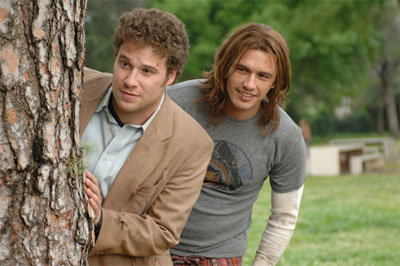
JUDD APATOW'S EXPRESS RIDE TO SUCCESS.
EXCLUSIVE Judd Apatow, Pineapple Express Interview by Paul Fischer.Judd Apatow, ex-stand up comedian, has finally found his niche as one of Hollywood's most successful producers of comedy films. Defined by their comic intensity and genuine warmth, Apatow is a comic force to be reckoned with. Former TV writer-turned-feature comedy guru Judd Apatow reached the peak of his professional career in the late 2000's after a long and steady climb up the Hollywood ladder. Considered one of the hottest comedy "punch-up" men in the industry, Apatow's services were originally in high demand as a script doctor. As a television producer, however, Apatow's career was practically cursed. Plagued by a cycle of critical praise, cult followings and speedy cancellations, Apatow's work on such quality shows as "The Ben Stiller Show" (Fox, 1992-93), "The Larry Sanders Show" (HBO, 1992-98), "Freaks and Geeks" (NBC, 1999-2000) and "Undeclared" (Fox, 2001-02 ) were a mixed bag of blessings. Still, the quality of his work won Apatow more than a small measure of respect. In 2005, he became a triple-threat by making his film directorial debut, resulting in a homerun with the "The 40-Year-Old Virgin" (2005). The film not only put him on the map, it made a marquee name out of its star, Steve Carell and ushered in a new era of sophomoric R-rated comedies with heart. With a reserve of respect built up after the instant comedy classic that was "Virgin," expectations were high for Apatow's second directorial outing - the 2007 comedy, "Knocked Up." Proving his first foray was no fluke, "Knocked Up" resonated with fans, and again, with impressed critics, who universally hailed it the "comedy of the summer." Suffice to say, every comedic actor in town looked to join the very exclusive Apatow comedy repertory company - an elite, tight-knit group that included Paul Rudd, Seth Rogen, Will Ferrell, Carell and Apatow's wife, Leslie Mann.
Born on Dec. 6, 1967, in Syosset, New York, Judd Apatow got his start in showbiz while still in high school. Thanks to the support of one of his teachers, Apatow became involved with the school's student radio station. Though the station's signal just barely reached outside of the school's parking lot, Apatow launched his own radio show. A precocious disciple of comedy, as well as an aspiring comedian himself, Apatow used this forum to interview such then-unknowns as Weird Al Yankovic, Jay Leno, Jerry Seinfeld and Michael O'Donoghue. Moving out west in 1985, following graduation from high school, this self-confessed "geek" enrolled at USC Film School. After classes, Apatow began hanging out at the local comedy clubs and fell in with the fertile L.A. comedy scene. In fact, his first job was as a dishwasher in a comedy club, which he took so that he could meet stand-up comics.
As it turned out, Apatow discovered his true calling somewhere else other than the stand-up stage. While crashing and burning at the mic each night might have stung his ego at first, Apatow eventually made peace with the fact that he was a far better joke writer than a joke teller. Consequently, Apatow began writing for other comics. Thanks to his consistently brilliant, yet infinitely adaptable sense of wit, Apatow began making decent money writing punchlines for comics as diverse as Jim Carrey, Garry Shandling and Roseanne Barr. In fact, years later, in a 2007 interview with Entertainment Weekly, funnyman Will Ferrell summed it with the following: "[Judd Apatow] has his own ideas of what's funny, but one of his great strengths is to be able to see what you do and mold things toward your strengths."
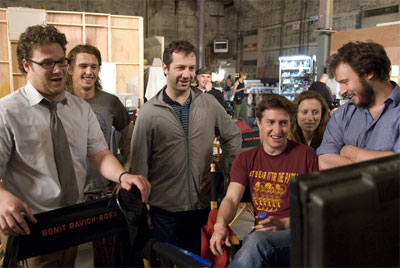 In 1991, Apatow was hired by a then little-known actor named Ben Stiller, who was trying to launch a TV sketch comedy show on MTV. Hired to be his main writer, Apatow suddenly found himself thrust into the lofty position of Executive Producer when "The Ben Stiller Show" was picked up a year later. Amazingly, despite a complete lack of television experience, Apatow successfully managed to wing it through the entire season. Even though its ratings were never fantastic, "The Ben Stiller Show" became a critical darling, earning Apatow an Emmy for Outstanding Individual Achievement in Writing in a Variety or Music Program. Not long after that show was canceled, Apatow landed a job writing and co-executive-producing for "The Larry Sanders Show," where he would go on to earn six more Emmy nominations for his writing. Apatow's first network project - the fondly remembered "Freaks and Geeks" - proved to be a bittersweet experience. A broad comedy with surprisingly poignant moments, the show borrowed heavily from the feature comedy classic, "Fast Times at Ridgemont High" (1980). But as per the usual for Apatow, the show's devoted fan following and critical praise had little impact on its all-important ratings.
In 1991, Apatow was hired by a then little-known actor named Ben Stiller, who was trying to launch a TV sketch comedy show on MTV. Hired to be his main writer, Apatow suddenly found himself thrust into the lofty position of Executive Producer when "The Ben Stiller Show" was picked up a year later. Amazingly, despite a complete lack of television experience, Apatow successfully managed to wing it through the entire season. Even though its ratings were never fantastic, "The Ben Stiller Show" became a critical darling, earning Apatow an Emmy for Outstanding Individual Achievement in Writing in a Variety or Music Program. Not long after that show was canceled, Apatow landed a job writing and co-executive-producing for "The Larry Sanders Show," where he would go on to earn six more Emmy nominations for his writing. Apatow's first network project - the fondly remembered "Freaks and Geeks" - proved to be a bittersweet experience. A broad comedy with surprisingly poignant moments, the show borrowed heavily from the feature comedy classic, "Fast Times at Ridgemont High" (1980). But as per the usual for Apatow, the show's devoted fan following and critical praise had little impact on its all-important ratings.Transitioning into movies toward the late 1990s, Apatow's screenwriting career got off to a rocky start with the basketball-themed comedy, "Celtic Pride" (1996). Luckily for Apatow, his fortunes would quickly improve. That same year, he produced and wrote the screenplay for the dark comedy, "The Cable Guy" (1996). Because of its dark tone, the film received mixed reviews, but went on to make a respectable profit at the box office - due in no small part to star Jim Carrey.
Apatow returned to TV series once more with "Undeclared," a quintessential modern college series which centered on a group of college freshmen at the fictitious University of North Eastern California. The short-lived show, which took its name from the status of an undergraduate who has yet to "declare" a specific major of study, gave a humorous and usually accurate look at the highs and lows of college life - from young adult relationships to the dreaded freshman fifteen. In the cast, was Apatow's good friend and future big screen collaborator, Seth Rogen, who would go on to become an integral part of Apatow's comedy frat pack.
After co-producing the two Will Ferrell hits, "Anchorman: the Legend of Ron Burgundy" (2004) and the soccer-themed comedy "Kicking & Screaming" (2005), Apatow felt ready to direct a movie himself. Eager to work with Steve Carell - whom he had met on the set of "Anchorman" - Apatow and the actor brainstormed for hours until they came up with the premise for what would eventually become "The 40-Year-Old Virgin." Made for a little over $25 million, "Virgin" became the surprise comedy hit of the season, earning nearly $110 million domestically and nearly doubled its money overseas.
In 2007, Apatow made a long-awaited return to the director's chair for his next feature effort "Knocked Up." Starring his old buddy Seth Rogen "Knocked Up" was declared "more explosively funny... than nearly any major studio release in recent memory," by Variety. The film made back its budget in the first weekend with a box office take of nearly $30 million, earning Apatow even more goodwill from studios anxious to bankroll one of his many film projects via Apatow Productions, as well as smart comedy fans who christened him the "Mayor of Comedy."
As a producer, Apatow went on to shepherd Superbad, co-written by Rogen and his lateast venture, Pineapple Express, starring Rogen and James Franco, is due out shortly. The film tyells of two stoners on the run from drug dealers in what could be the first weed-themed action comedy. Apatow will return to the director's chair in the Fall helming Funny People, with ex-room mate Adam Sandler.
Paul Fischer chatted one-on-one with the prolific Mr Apatow.
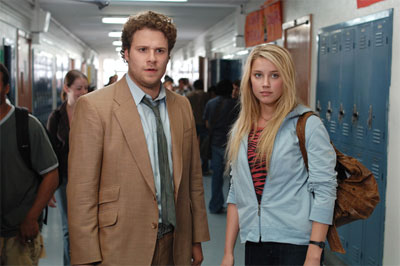 Paul Fischer: Seth [Rogen] was telling me that you had the germ of this idea as sort of a weed smoking action movie. Based on your own personal fantasies, youthful exuberance?
Paul Fischer: Seth [Rogen] was telling me that you had the germ of this idea as sort of a weed smoking action movie. Based on your own personal fantasies, youthful exuberance?Judd Apatow: I was watching True Romance, and this was so long ago that I was watching it on Laser Disc. So this is like mid to late 90s, and I thought that Brad Pitt was so funny as this crackhead. He has one scene and it really made me laugh ,and I thought to myself, I wish these killer were chasing him and not Christian Slater. That would be funny. Then I thought, you know, maybe whenever they make a stoner movie it never has any action. What if you made an action movie where the people they were chasing were high and that makes it harder to get away. And then it's kind of a little bit of a morality tale of, the only way these guys can realize that getting high ruins their lives is by trying to escape from murderers while high. And you know, I thought a process server was a job I always thought was an interesting way to get into this thing. I always had this vision of underground, you know, an underground farm of marijuana with grow lights, that sort of, I kind of had images in mind. So me and Seth and Evan [Goldberg] sat down and did a bunch of sessions breaking the outline.
Paul Fischer: Why Seth and Evan in particular? Did you decide this independent thinking about them?
Judd Apatow: You know, they showed me Superbad, we did a table read of Superbad, it was very, very funny. We couldn't get anybody to make it because at the time the subject matter seemed pretty graphic. And the script evolved over the years and became much sweeter. In the early stages it had all that hard comedy but without some of the connection between the two guys. So I was trying to think of something else to do with them because I knew that these were very special, hilarious comedy writers. I thought that the Pineapple Express idea was more commercial than Superbad. What I didn't realize was, it was way less commercial than Superbad, because it suddenly was a pot action movie with no stars-that's before [James] Franco came on.
Paul Fischer: This is before 40 Year Old Virgin?
Judd Apatow: And a little bit after 40 Year Old Virgin, we couldn't get it made until -during Superbad is when it was green lit. The studio saw the dailies of Superbad, and said, we think that this, we like what you're doing. And so, then we finally were able to get it made. But we worked on it for half a decade, doing table reads, re-writing it, getting it in shape.
Paul Fischer: Where does the enthusiasm come from with you, that you can stick with something like this? Superbad was thought of 15 years ago, or whatever it was?
Judd Apatow: You know, some people remember every baseball game they ever went to, they remember all of the sports scores. For me, I never lose touch with why something is funny. So if something made me laugh eight years ago, I don't get bored with it. I just get frustrated that I can't get it made. And I always thought this was a good idea, and I love the idea of following up Knocked Up with an action comedy. You know, this movie is kind of like Superbad with a high body count. And Seth was so enthusiastic about making an action movie, like a little kid, so excited about blowing things up and figuring out ways to shoot people.
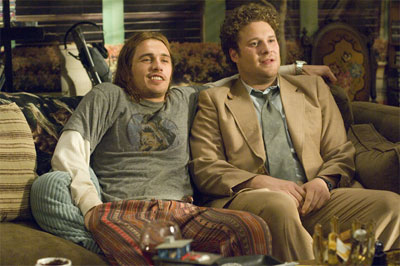 Paul Fischer: He was talking about his love of comic books, he was buying stuff at ComicCon and all that.
Paul Fischer: He was talking about his love of comic books, he was buying stuff at ComicCon and all that. Judd Apatow: Yeah. It's infectious, you know, it really is, and they're great writers. I was watching Pineapple Express in Montreal and I thought, these are two of the funniest guys ever, they really have banged out two classics. And it's an amazing achievement.
Paul Fischer: Where does your sense of humor come from? Where is it derived from?
Judd Apatow: I don't know. The first comedy that I listened to was Bill Cosby albums, my dad exposed me to Bill Cosby albums when I was really little. That turned into George Carlin records and Steve Martin records, and when I was young, Saturday Night Live came on the air, when I was eight. So I grew up right in the period when Albert Brooks and Monty Python and Saturday Night Live and Harold Ramis and Ivan Reitman and John Landis were making all these movies, and then later I started discovering Hal Asbhy and James Brooks and Cameron Crowe. As I get older I find the people who came before them. Then you get older and you go back and watch Billy Wilder and Buster Keaton and W.C. Fields. So, I was always interested in justice. I liked that comedians were pissed off and they were telling you what was wrong with the system, what was wrong with people, where the bullshit was. And I must have been pissed as a kid, because I loved George Carlin saying why it made no sense that you can't say the seven words on television. I must have felt that as a kid who was bad at sports, who was younger than all the other kids, that the system was working against me-I loved people who would flip the bird at the system.
Paul Fischer: Did you expect to be doing this when you were younger?
Judd Apatow: I never wanted to write and direct, I wanted to be a standup comedian. And then I did it for about seven years. Till 1992, and then I slowly realized that I wasn't angry enough to be great at it.
Paul Fischer: You think you have to be pissed off at the world/?
Judd Apatow: I think you have to have a lot on your mind. and I was more interested in people and relationships than I had a list of gripes. So, and I knew I wasn't as funny as the guys I was hanging out with, Jim Carrey and Adam Sandler were so much funnier than me and they had so much charisma. I knew I wasn't packing what they were packing. And my writing career started taking off, I was working n the Ben Stiller sketch show. I thought, well, everything seems to be pushing me in this direction, I'm just going to go with the river.
Paul Fischer: What inspired you to develop Freaks and Geeks? Was that all autobiographical?
Judd Apatow: You know, I had a television development deal at DreamWorks, and I told my friend Paul Feig that if he ever had a good TV idea to let me know. And then one day he just handed me Freaks and Geeks , and it was the pilot episode, and it was fantastic. It was really fully formed. He wrote an eighty-page bible to it explaining the whole world. He wrote a second episode to show what the series would feel like. And then me and Jake Kasdan collaborated with him, you know, on the development once it became real. But Paul had this amazing vision, and I realized that I could also funnel in all of my high school issues. Then, you know, you get a staff and they tell you all their stories and before you know it, it evolves into something that's very personal to a lot of people.
Paul Fischer: It got incredibly good reviews, and it has a cult following. What lessons did it teach you about the politics of television?
Judd Apatow: For me, I always thought, I'm not going to ruin the show to survive, and so I never would survive. it's as simple as that. I told Paul, let's do the best we can, if there's a way to collaborate with the network and studio we will, but this has to be exactly right for you. And Paul was very willing to go down with the ship to protect his vision for it, which was very brave. Because he could have said, "What can we do? How can we survive? What should we change?" But he didn't. And as a result the show plays like an 18-episode mini-series, as opposed to a television series. We always knew it was going to get canceled, so we made it as if it was one story.
Paul Fischer: With a finale that felt right.
Judd Apatow: Yeah, we worked on the finale very early in the first season, Paul started writing the finale, and we shot the finale five episodes before we stopped shooting, because we didn't want to get shut down and not have made the finale.
Paul Fischer: Was Freaks and Geeks the stepping-stone for you as a feature filmmaker?
Judd Apatow: Well the first directing I did was one episode during the last season of the Larry Sanders Show. Which was very nice of Garry [Shandling] because I would not have done it if he didn't ask me. I was terrified to try my hand at it, the actors scared me because they were so accomplished. And then I directed a few Freaks and Geeks and a few Undeclared. And slowly worked up my courage to call myself a director.
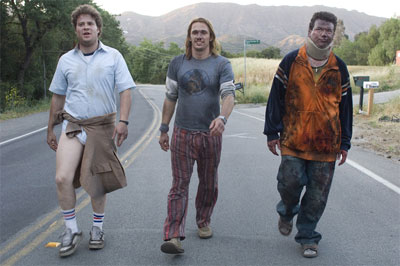 Paul Fischer: How surprised are you at your success in the movie business?
Paul Fischer: How surprised are you at your success in the movie business?Judd Apatow: You know, I'm thrilled. I don't go into a place of surprise, only because it took so long that that's not the emotion I go into.
Paul Fischer: Are you relieved?
Judd Apatow: I'm not relieved, I'm more stunned. There's a difference between surprised and stunned. I'm stunned because I have to deal with it, and try to do good work. You know, I so obsess on trying to make everything as strong as it can be that I don't give myself much time to purely enjoy most aspects of it.
Paul Fischer: That's unfortunate, isn't it?
Judd Apatow: It is. I keep all the clippings and I keep a lot of mementos, and I think to myself, you know, in a few years I'll just sit down and I'll take off some time and I'll look at my stuff and I'll really enjoy it. I do, because what I enjoy is just interacting with everyone. It's really fun spending time with Will Ferrell and Adam McKay and John C. Reilly and Seth and Evan, and now I'm working with Adam Sandler and my wife Leslie on the next movie. That's what I enjoy, I enjoy the pure creative interaction with everybody. But in terms of the results part I don't think too much about it.
Paul Fischer: Is there an Apatow brand? Is there a certain expectation that an Apatow movie is going to have a certain comic sensibility to it?
Judd Apatow: I don't know. You know, for me these are things that I would like to see or things that find amusing or that touch me, but I can't really break it down. Other people seem to be finding all of the common denominators, and when I read that I think, Should I stop? It seems like everyone is finding the seams on the ball. Everyone can see the seams on the ball! But it really is just things that make me laugh. Walk Hard cracks me up. You know, I'm a big music fan, I love the history of rock and roll.
Paul Fischer: I loved that movie, I was very sad that that film didn't do better.
Judd Apatow: It's on DVD and it will be on cable forever and it really is hilarious. On Blu Ray there's so much stuff, so many other songs. And so I enjoy that, I enjoy Pineapple with the action and weed, I enjoy Superbad because it's sweet.
Paul Fischer: All your movies have that certain, what's interesting is that they're not only hard-edged comedies, they all have this inherent emotionality to them, which I guess everyone says you bring to that material. Why is that important?
Judd Apatow: I don't know. As a kid, I really responded to the TV show Taxi. I loved Mary Tyler Moore and Rhoda, all of the James Brooks, the Grant Tinker, MTM era sitcoms. But Taxi was hard funny, but then it was always very sweet and emotional, and how hard it is just to be a person on earth. They would always pull out of the comedy and have a, you know, like a tender profound moment, and it never felt inorganic, it always felt right for their story. I always loved that. I mean, it's, what's better than Albert Brooks yelling at Holly Hunter in Broadcast News, there's nothing better than that. Being There.
Paul Fischer: Is it more important to you to have an overall creative control of these projects, or do you miss also the hands-on directing, which you're not doing so much of, because you're so busy producing?
Judd Apatow: I'm trying to direct a movie every other year, I'm trying to set that pace, right? Take a year to right and then make one, and in the year that I'm writing , I'm helping produce other movies. But no, I don't need to control all the movies, it's really fun for me to just assemble teams. To just, you know, just to say, OK, well, Shauna Robertson will produce with me and David Gordon Green will direct and Seth and Evan will be there, and James [Franco] and Seth, and you just go, that's a pretty amazing team. And once they've done the table read and it's cast you kind of let it go. There's a few things you keep an eye on but you don't want to mess with it too much.
Paul Fischer: Like a child that's leaving the house.
Judd Apatow: Yeah, then when you're done, start looking at the footage, seeing if you missed anything, figure out how to put it together. For me, I just try to be a very kind of clear, frank, outside eye on a lot of these projects. And it's fun to be fresh on it, but to let people do what they do. David Gordon Green is an amazing artist, so.
Paul Fischer: It was very interesting that he was hired to direct this.
Judd Apatow: Yeah, you want to stay out of his way a little bit. What he does it so different than what I do, I want him to understand what I'm going for, but I don't want to accidentally trample on the delicacy of what he brings to a movie like this.
Paul Fischer: What's the film you're doing with Sandler?
Judd Apatow: It's called Funny People. It's Adam and Leslie and Seth, and the supporting parts are Jason Schwartzman, Jonah Hill and Eric Bana. It's about comedians and funny people and it's about how one comedian has a near-death experience and how he reacts to it. There's some standup performance.
Paul Fischer: Does it draw on your experiences with standup comedy?
Judd Apatow: Yeah, it's based a little bit on that. That's what I'm going to direct. I'm writing and directing Funny People and that starts end of September.
Paul Fischer: Are you looking forward?
Judd Apatow: I'm very excited. Janusz Kaminski is shooting it, which is very--very-
Paul Fischer: So it'll be like Schindler's List.
Judd Apatow: It'll be the Schindler's List of stand-up comedy movies. It's a creatively ambitious movie that hopefully will also be very funny and emotional.
Paul Fischer: Is it a summer film?
Judd Apatow: It's supposed to come out next summer. If I finish.
Paul Fischer: What else are you looking forward to seeing, out of the films that you've produced?
Judd Apatow: Well, we're in post on Year One, the Harold Ramis movie with Jack Black and Michael Sera.
Paul Fischer: That's where they go into Biblical times?
Judd Apatow: Yes. It's hilarious. Michael Sera and Jack Black are just a classic pairing of people. So that comes out next summer. And the only other project we have that's gearing up is, in the spring we're going to shoot this movie called Get Him to the Greek, which is written and directed by Nick Stoller, who directed Forgetting Sarah Marshall, and it's stars Russell Brand as the same character. Jonah Hill gets his first job working for a record company, and his job is to get him from England to his concert at the Greek theater-but Russell has fallen off the wagon. So that's in the spring we're going to shoot that.
Paul Fischer: Will you ever take a break?
Judd Apatow: I have a dream of taking a break, but I don't want to tell anybody because then if I don't take it everybody will be mad at me.
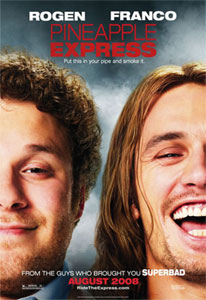
Pineapple Express
Starring: James Franco, Seth Rogen, Amber Heard, Danny McBride, Gary ColeDirector: David Gordon Green
Screenwriter: Seth Rogen, Evan Goldberg
Producer: Judd Apatow, Shauna Robertson
Genre: Comedies
Rated: R for pervasive language, drug use, sexual references and violence
Runtime: 1 hr 51 mins
Next summer, the guys who brought you Superbad reunite for the action-comedy Pineapple Express. Lazy stoner Dale Denton (Seth Rogen) has only one reason to visit his equally lazy dealer Saul Silver (James Franco): to purchase weed, specifically, a rare new strain called Pineapple Express. ... Next summer, the guys who brought you Superbad reunite for the action-comedy Pineapple Express. Lazy stoner Dale Denton (Seth Rogen) has only one reason to visit his equally lazy dealer Saul Silver (James Franco): to purchase weed, specifically, a rare new strain called Pineapple Express. But when Dale becomes the only witness to a murder by a crooked cop (Rosie Perez) and the city's most dangerous drug lord (Gary Cole), he panics and dumps his roach of Pineapple Express at the scene. Dale now has another reason to visit Saul: to find out if the weed is so rare that it can be traced back to him. And it is. As Dale and Saul run for their lives, they quickly discover that they're not suffering from weed-fueled paranoia; incredibly, the bad guys really are hot on their trail and trying to figure out the fastest way to kill them both. All aboard the Pineapple Express.
The film is directed by David Gordon Green (All the Real Girls). The screenplay is by Seth Rogen & Evan Goldberg from a story by Judd Apatow and Seth Rogen & Evan Goldberg. Judd Apatow and Shauna Robertson produce.
MORE





